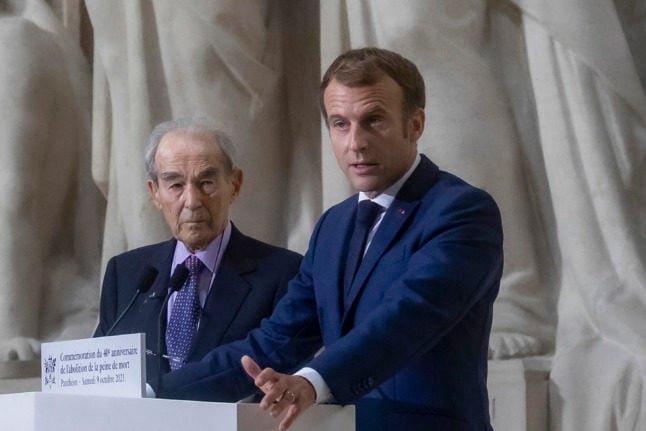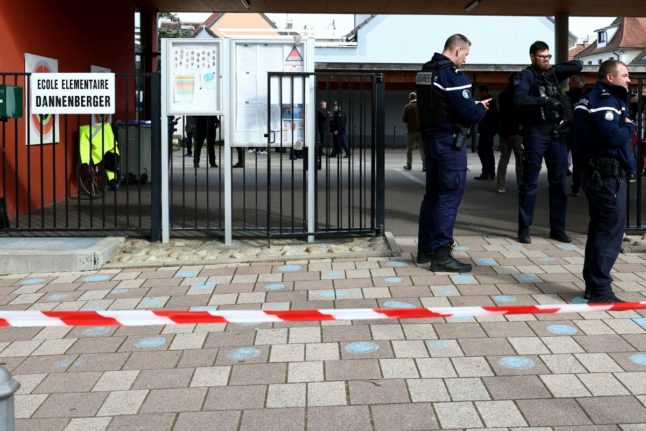Emmanuel Macron visited Paris’ Pantheon on Saturday to attend a special exhibition to mark the 40th anniversary of the death penalty in France.
He was accompanied by Robert Badinter, the former justice minister, who helped push the law through the National Assembly.
In a rousing 1981 speech given shortly before the legislation was enacted, Badinter said: “Tomorrow, thanks to you, the French justice system will no longer be a system that kills… These bloody pages in the history of our justice system will be turned.”
Today, more than two thirds of the World’s nations have outlawed the death penalty but it still applies in some 54 countries.
According to the French foreign ministry, France is one of the “principal nations” fighting for the elimination of the death penalty around the world.
Il y a 40 ans la France abolissait la peine de mort.
Depuis 40 ans, la diplomatie française œuvre pour l’abolition universelle de ce châtiment inhumain et inefficace.
👉 https://t.co/WpsuY0r0w0 pic.twitter.com/MqypO9oUMa
— France Diplomatie🇫🇷 (@francediplo) October 9, 2021
But in Western Europe, only Belgium was behind France in banning the death penalty. So what is the history of capital punishment in France?
The guillotine
For years, the guillotine was synonymous with the French justice system.
The decapitation device was developed over several years by the physician, Joseph-Ignace Guillotin, and came to prominence during the French revolution.
In line with the egalitarian principals of the revolution, the guillotine aimed to level the playing field when it came to executions.
Prior to the introduction of the guillotine, commoners would be hung, tortured, boiled, dismembered, burned or beaten to death with hammers while strapped to a wagon wheel. Noblemen on the other hand would typically meet a swifter demise – decapitation by sword.
In other European countries, noblemen were at liberty to choose their method of execution – in 1487, the Duke of Clarence was drowned in a barrel of sweet wine.
Some 17,000 people were executed by guillotine during the revolution’s ‘Reign of Terror’ between 1793-1794.
During this period, executions became a form of mass entertainment (for those lucky enough to be spared the chop). Tourists would travel from all over the country to witness beheadings in sites like Place de la Concorde in Paris – which at the time was known as Place de la Révolution. Souvenirs such as rags dipped in the blood of the victim – and in at least one recorded case, eyeballs – were sold to the crowd.
40 years ago today, France abolished the death penalty.
This long and turbulent struggle fuelled the political and public debate for centuries and marked a sharp turn in French history.#CNRSnews #Badinter #peinedemort #abolition #deathpenalty https://t.co/Qo0SGmO6NT
— saman musacchio (@musacchios) October 9, 2021
At the time, there was considerable public debate as to whether heads retained consciousness for a certain period following execution.
When Charlotte Corday, a revolutionary herself, was executed by guillotine, one of the executioners lifted her severed head in front of the crowd and slapped it. One onlooker who witnessed about the event described her expression changing to one of “unequivocal indignation”.
The last public guillotining took place in 1939. After clandestine photos and videos were made and spread around the country, the authorities feared moral panic and decided that all future executions would take place inside prisons.
While the guillotine remained France’s official method of execution up until abolition in 1981, its final use was in Marseille in 1977. The victim was a Tunisia-born torture-murderer, Hamida Djandoubi.
The fight for abolition
Various figures questioned the death penalty even at the time of the revolution itself.
Maximilien de Robespierre, a revolutionary leader who himself was eventually executed by guillotine, supported a bill to abolish the death penalty altogether.
The writer, Victor Hugo, was another prominent critic of the death penalty during the 19th century.
A bill supported by French socialist leader Jean Jaurès to abolish capital punishment was rejected by parliament in 1905.
Momentum began to swing in 1977 when Badinter, who later went on to serve as Minister of Justice, was acting as a lawyer for Patrick Henry, a convicted child-murderer. Badinter persuaded the jury to give Henry life imprisonment instead.
Backed by the French President, François Mitterand, Badinter would later abolish the death penalty in 1981 – even though more than 60% of the population still supported capital punishment.
“I am against capital punishment,” said Mitterand at the time. “I don’t need opinion polls to tell me otherwise.”
How do the French feel about the death penalty today?
A recent poll conducted by Ipsos/Sopra Steria found that 50 percent of French people still supported the death penalty.
Most of the country’s political class remain opposed to its reintroduction. But Eric Zemmour, the far-right pundit yet to declare his intention to run in next year’s presidential race but whom pollsters predict could face Macron in the second round, supports the measure.
READ ALSO: French poll predicts Zemmour-Macron showdown in 2022 presidential election
“I don’t think we did well to abolish the death penalty,” he told broadcaster BFMTV last month. “Philosophically, I favour it.”
Marine Le Pen, another right-wing leader in France, has said her party would conduct a survey if elected to assess whether it would be worth bringing back the death penalty. Supporters of her party, the Rassemblement National, are the most favourable towards its reintroduction.
The ban on capital punishment was enshrined into the constitution in 2007. Overturning it would plunge France into a constitutional crisis.
La France va relancer le combat pour l'abolition universelle de la peine de mort. Ce combat, nous le mènerons en Européens, encore et toujours. pic.twitter.com/mpPAed7Vgn
— Emmanuel Macron (@EmmanuelMacron) October 9, 2021
Emmanuel Macron has promised to organise a high-level meeting bringing together civil society figures from countries where the death penalty is still applied to convince leaders to abolish the practice.
Speaking at the ceremony on Saturday, Badinter described capital punishment as a “Disgrace for humanity”.



 Please whitelist us to continue reading.
Please whitelist us to continue reading.
Member comments